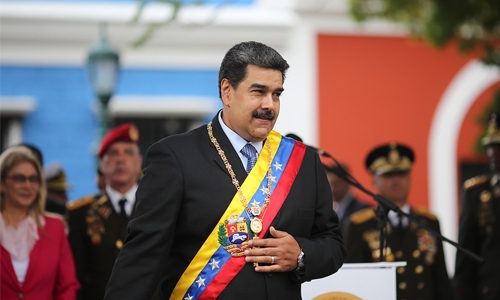One way to bring down Maduro and his cronies: indictments
Just a few months ago Venezuelans were filled with renewed hope: for a new president, for desperately needed humanitarian assistance, for democracy to be restored in their country. But with the failure of an uprising led by the opposition leader Juan Guaidó in April, 2019 has become a frustrating year for the people of Venezuela.
In the last few weeks they once again filled the streets to demand freedom and democracy. And yet Nicolás Maduro continues to hang on to an illegitimate claim to power. The United States government and a coalition made up of Venezuela’s neighbours have been right to raise the cost for Maduro and his cronies to continue business as usual. But those economic penalties may have reached their zenith.
Members of the coalition should increase pressure on the regime by bringing case in their own courts stemming from Maduro’s corruption. Maduro and his inner circle are accused of hiding money stolen from the Venezuelan government in personal bank accounts around the world; profiting off the drug trade; engaging in illegal mining; and committing human rights abuses, including torture and murder.
The secrimes have had far-reaching consequences. Yet very few indictments have been announced against Maduro or his colleagues. In 2017, Tareck El Aissami, who was then Maduro’s vice president, was indicted under the federal Drug Kingpin Act and his assets were frozen in the United States and elsewhere. But surely El Aissami is not the only one who deserves a legal reckoning.
There is precedent for the Department of Justice to focus action on areas that are aligned with the country’s foreign policy priorities. In 1988, the Justice Department indicted President Manuel Noriega of Panama and members of his inner circle when relations between Panama City and Washington were breaking down. More recently, the Justice Department indicted and sought to extradite Huawei’s chief financial officer as the United States was speaking out about security threats posed by Huawei technology and by China.
There is speculation in Washington that sealed indictments of members of Maduro’s inner circle already exist and that the Justice Department is waiting for the right moment to release them. The time is ripe to pursue new indictments against members of the Maduro regime. That doesn’t apply just to the United States, though it has stronger intelligence abilities that allow us to have a better sense of who may be committing what crimes. Countries like Colombia, where many Venezuelans have fled; Peru, where Venezuelan refugees have become victims of trafficking; and Argentina, whose criminal justice system has one of the broadest legal definitions of prosecuting “crimes against humanity,” should all be investigating whether Maduro associates have committed crimes within their jurisdictions.
Some would argue that bringing criminal charges against members of Maduro’s team is futile. Surely they will not be extradited to the United States or anywhere else. While that may be true, there is still weight in such actions. First, the judicial systems in the United States and many other countries in the Americas are still respected as being independent of the executive branches of those countries. While there is precedent for the Justice Department to focus on United States foreign policy interests, there is still an important separation between sanctions, which can be done at the whim of the executive branch, and indictments, which require evidence to be presented in a court of law.
Indictments are issued only if enough evidence exists to convince an independent court of law. Second, once indicted, Maduro and his cronies can be subject to an Interpol “red notice” that would severely limit their ability to travel outside Venezuela. Perhaps they will still be able to go to Cuba and Russia, but their shopping trips to Madrid, Paris and London will no longer be an option. Very quickly they will find that all of the illegally acquired money in their accounts is of no use to them if they have nowhere to spend it.
Third, evidence gathered by countries that are signatories to the Rome Statute, the international treaty that set up the International Criminal Court, can be turned over to the court for its own investigations. While the United States is not a member nation of the court, most Latin American countries are. An initial investigation by the court into allegations of torture by state actors in Venezuela was opened in February after six governments presented a formal request. Gathering evidence in order to issue indictments against other members of Maduro’s circle would be a resource-intensive effort.
The United States intelligence community would have to provide the Department of Justice with much of the evidence needed against individual Venezuelans. Our partner countries in the Americas would need to establish prosecutorial teams. Sharing intelligence the United States gathers with foreign partners would have to be prioritized, likely at the instruction of the attorney general or the president.
As the Venezuelan people continue to show their resiliency, the international community must also continue to show its resolve. The judicial systems of the Americas should shine a light on the growing darkness that is Venezuela and hold to account the many members of the regime who have kept themselves rich and powerful at the expense of their suffering citizenry.
Related Posts

